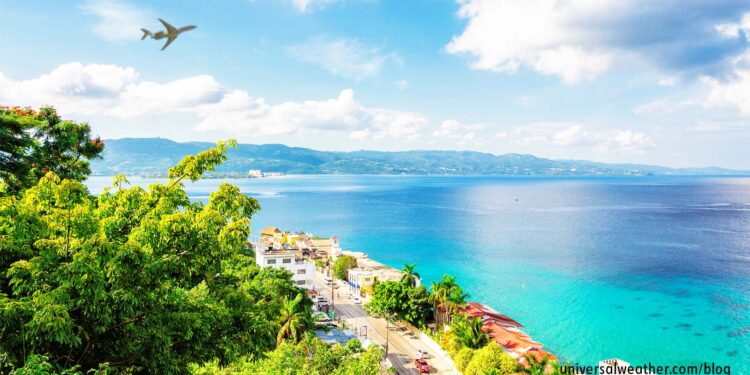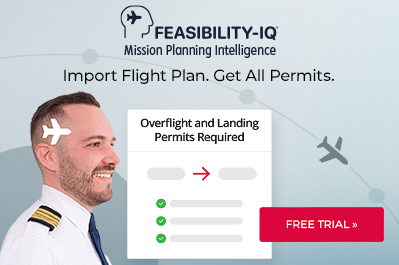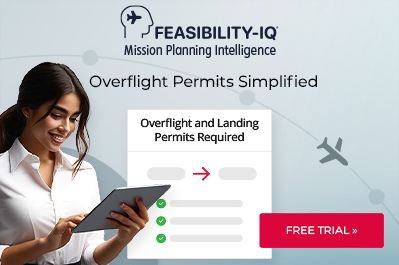Exploring Jamaica – Information for Bizav Operations

When operating a business aircraft to Jamaica, pay particular attention to documentation and landing permit requirements. Pre-plan and confirm credit, fuel availability and service requirements, as well as hotel and local transportation needs. Additional pre-planning is always necessary when operating to secondary or domestic airfields in Jamaica.
The following is an overview of what you need to know:
1. What’s the busy season in Jamaica?
While operators travel to Jamaica year-round, the busiest travel period is during the winter holiday season December 15 to April 30. Jamaica is also a popular, and efficient, year-round tech stop.
2. What airports are available?
Jamaica has six airports that accommodate business aircraft. Montego Bay (MKJS), Kingston (MKJP) and Ian Fleming Intl (MKBS) are the only Airports of Entry (AOEs) in Jamaica. Customs is available 24 hours at MKJS and MKJP, but the operating hours for MKBS are 0700-1900 local. MKBS has a 4,767-foot runway and 0700-1900 local airport operating hours. Other airports have limited ground handling and aircraft services availability and are seldom used by international operators. Ground handling arrangements can be set up for Kingston (MKTP) with prior notification. No services are available at either Ken Jones (MKKJ) or Negril (MKNG). Be aware that you’ll need to clear into and out of Jamaica, at AOEs, when operating to smaller domestic airports in Jamaica.
3. Are landing and overflight permits required?
Landing permits are only needed for charter operations. There’s a specific form – a Non-Scheduled Journey Application form – that needs to be submitted with landing permit requests, and it must be filled out by the operator. Permits are not necessary for charter flights making technical stops in Jamaica, so long as crew or passengers do not embark or disembark. Landing permits are not required for air ambulance flights. No overflight permits are required for Jamaica.
4. What’s the charter permit lead time?
Official lead time for a Jamaica charter permit is four working days, but permits may be processed with less notice at the discretion of the Civil Aviation Authority (CAA). When requesting landing permission, keep in mind that Jamaica CAA operating hours are Monday-Friday, 0800-1600 local.
5. What documentation is needed for landing permits?
You’ll need to provide certificates of airworthiness, registration and insurance, along with an Air Operator’s Certificate (AOC) and a Non-Scheduled Journey Application form. For US-registered aircraft, you must also provide an Airplane & Route Authorization form or, alternatively, FAA DO85 and B050 forms. For non-US-registered aircraft, the CAA may request additional documentation in lieu of these documents.
6. What about landing permit revisions?
Permit revisions are needed if the estimated time of arrival, the estimated time of departure, the origin/destination or aircraft registration changes. Permit revisions are possible after-hours at the discretion of the CAA. Notification is only necessary for changes to crew and passengers. The validity of Jamaica landing permits is for the same Zulu day.
7. Where are flight plans filed?
Flight plans for all flights departing MKJP and MKJS are filed with the Aeronautical Information Service (AIS) at MKJP 1200-1400 UTC. Outside of those hours, flight plans should be faxed to MKJP Air Traffic Control (ATC).
8. What’s needed to set up ground handling?
To set up ground handling, send the tail number, aircraft type, operator details, crew and passenger information and schedule to your ground handler in advance. As ground handlers are not always on the field 24 hours, advance notification is normally required for after-hour operations. Requests for aviation fuel and aircraft services should be made at least 24-48 hours in advance.
9. What are the considerations for credit for services?
Credit for services can be an issue when operating to Jamaica. Credit for services is available at four airports: MKBS, MKJS, MKJP and MKTP. Aviation fuel credit, however, is available on a case-by-case basis at MKJS and MKBS. It’s often possible to have the ground handler invoice your 3rd-party provider. Always check and confirm aviation fuel credit arrangements in advance.
10. Are fuel delays common?
Scheduled commercial aircraft always take precedence over private non-revenue and charter (non-scheduled commercial) operations. If you’re positioned on a Fixed-Base Operator ramp – such as at MKJS – there will usually be no fuel delays. Fuel shortages are notified in advance. 48 hours’ advance notice is recommended to arrange fuel uplifts at MKJS and MKJP. Overtime charges may be imposed on occasion for fuel uplifts for after-hour service.
11. Are there any airport slot, PPR or parking issues to consider?
There aren’t any airport slots or Prior Permission Required (PPR) requirements at any airport in Jamaica. When traveling to the two major airports – MKJS and MKJP – aircraft parking issues are rare unless you’re operating a large aircraft (ACJ, BBJ or larger). It’s best practice to confirm aircraft parking in advance to avoid last-minute delays or schedule adjustments.
12. What documents are needed?
All operators when traveling to Jamaica must have five inbound and five outbound General Declarations (gen decs) to present to the ground handler. Of those, four can be photocopies, but one must be an original for customs. In addition, a customs, immigration and quarantine form must be filled out, along with a Sentry Movement Form (one per flight). When landing at MKJP, a Pilot Clearance Certificate must be submitted to airport authorities on arrival. Be mindful that Jamaica requires a gen dec, stamped by customs, for departure as proof that the flight has been cleared outbound. If your flight returns to Jamaica after takeoff, the ground handler may be fined by customs, if the captain does not have a stamped departure gen dec from the original departure.
13. What’s involved in domestic airfield operations?
In order to operate to a domestic airfield in Jamaica, you must first land at an AOE and have your ground handler fill out a Coastwise Clearance Form. This special form can only be completed by a licensed ground handler in Jamaica.
14. Is CARICOM APIS necessary?
CARICOM APIS is a requirement when operating to, from or within Jamaica. APIS notification must be given at least 30 minutes prior to departure. If APIS requirements are not met, fines may be levied upon arrival, or aircraft/passengers/crew may be refused entry into the country. Customs officials do check to confirm that CARICOM APIS has been submitted, and it’s at their discretion to levy fines or deny entry.
15. Is security a concern?
While major airports in Jamaica are secure, precautions should be taken at smaller airfields and when off-airport. Avoid rental vehicles if you’re unfamiliar with the area. All local transportation arrangements should be made via your ground handler or hotel.
Conclusion
Work with your ground handler to coordinate any permit or schedule changes. Always be mindful of potential credit and service availability issues when planning operations to Jamaica.
Questions?
If you have any questions about this article or about operations to Jamaica, contact me at katherineperry@univ-wea.com.




